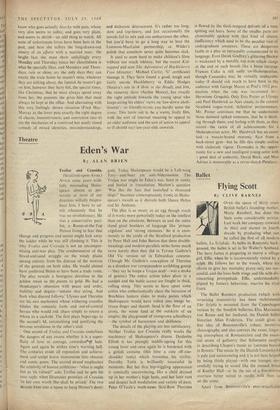Theatre
Eden's War
By ALAN BRIEN Troilus and Cressida.
5 (Stratford-upon-Avon.) AFTER some years wish- fully misreading Shake- speare almost as per- versely as most of our directors wilfully Mispro-. duce him, I have to ad- mit reluctantly that he was no revolutionary. He was a conservative paci- fist, a Room-at-the-Top Person living in fear that
change and progress and unrest might kick away the ladder while he was still climbing it. This is why Troilus and Cressida is not an uncompro- mising anti-war play. The condemnation of the blood-and-sand struggle on the windy plains sprang entirely from his distrust of the motives of the generals on both sides. He would almost have preferred Helen to have been a trade route. The play Teveals a bourgeois devotion to the golden mean as the deans to gold. He had a shopkeeper's obsession with peace and order, stability and degree—'untune that string, And hark what discord follows.' Ulysses and Thersites arc his two marksmen whose withering crossfire riddles the romantic fools and out-of-control heroes who would risk chaos simply to return a whore to a cuckold. The first plays Super-ego to the second's Id, rationalising and justifying the envious revulsions in the other's soul;
One strand of Troilus and Cressida undeilines the dangers of any excess whether it is a super- fluity of love or courage, cowardicelVt hate. Again and again he strikes time's warning bell. The centuries erode all reputation and achieve- ment and sculpt brave monuments into obscene and comic poses. The second strand emphasises the relativity of human ambitions—'what is ought but as 'tis valued?' asks Troilus and he gets his sour reply when Diomedes promises of Cressida 'to her own worth She shall be prized.' The two strands knot into a noose to hang Homer's demi-
gods. Today Shakespeare would be a Left-wing Tory--anti-Suez yet anti-Aldermaston. The. Trojan war might be Eden's war, born in vanity and buried in irresolution. Marlow's question 'Was this the face that launched a thousand ships?' becomes contemptuously ironic in Shake- speare's mouth as it shrivels both Queen Helen and Sir Anthony.
The play is as meaty as an egg though much of it works more poWerfully today on the intellect than on the emotions. Between us and the satire stand great boulders of language like 'princes orgulous' and 'strong immures.' So it is enor- mously to the credit of the Stratford production by Peter Hall and 'John Barton that these double- meanings and modern parallels strike home much more keenly than they did in Tyrone Guthrie's Old Vic version set in Edwardian costume. (Though Mr. Guthrie's conception of Thersites as a drunken war correspondent scribbling gossip —'they say he keeps a Trojan drab'—was a stroke of genius.) The entire action takes place in a sandpit and the battle scenes are fought in thick, rolling smog. This seems to have upset some critics who enthusiastically cheer the intrusion of Brechtian lantern slides to make points which Shakespeare would. have rolled into image be- tween finger and thumb. Sand is the floor of an arena, the waste land at the outskirts of an empire, the playground of overgrown schoolboys ---the symbol of barrenness and shiftiness.
The details of the playing are less satisfactory. Neither Troilus nor Cressida really works the machinery of Shakespeare's drama. Denholm Elliott is too plumply middle-ageing for this young lover and once again he is burdened with a girlish costume (this time a cute off-one- shoulder tunic) which travesties his virility.
Dorothy Tutin is brilliantly successful in moments. But her first hip-wiggling appearance is comically unconvincing, like a child dressed up in her mother's high heels, and her later rant and despair lack modulation and variety of.pace. Peter O'Toole's moth-eaten Skid-Row Thersites is flawed by the thick-tongued delivery of a man spitting out hairs. Some of the smaller parts are abominably spoken with that kind of sincere inefficiency which used to be the peculiar vice of undergraduate amateurs. These arc dangerous faults in a play so intractably concentrated in its language. Even Derek Godfrey's glittering Hector is -weakened by a metallic top note which clangs at the end of each breath like a brass rat-trap. Frances Cuka is still sadly un-Shakespearian, though Cassandra may be virtually unplayable today (I should risk much to have been in the audience with George Moore at Poet's 1912 pro- duction when the role was incarnated in- Hermione Gingold). Only Eric Porter as Ulysss and Paul Hardwick as Ajax create, in the current Stratford vogue-word, 'definitive' performances. Mr. Porter convinces me that he understands those damned spiked sentences, that he is think- ing through them, and feeling with them, as they unreel--the rarest of all achievements for a Shakespearian actor. Mr. Hardwick has an easier task—a muscle-bound moronic Ajax from a back-street gym—but he fills this simple outline with elaborate vigour. Diomedes is the -oppor- tunity for a new and intelligent young actor with .1 great deal of authority, David Buck, and Max Adrian is memorable as a revue-sketch Fondant:"


































 Previous page
Previous page